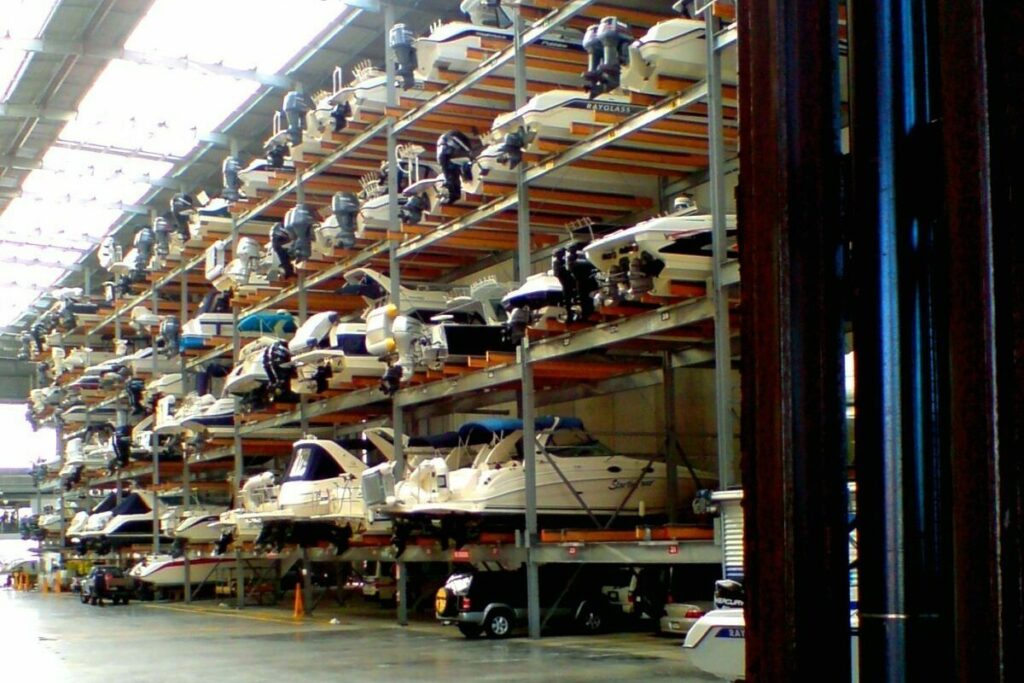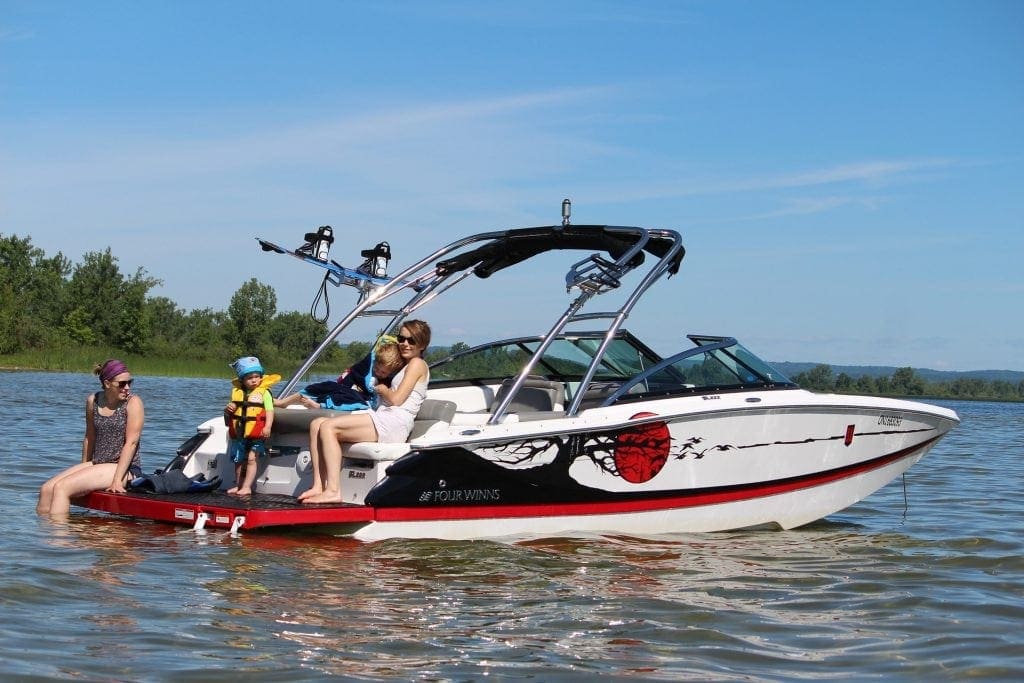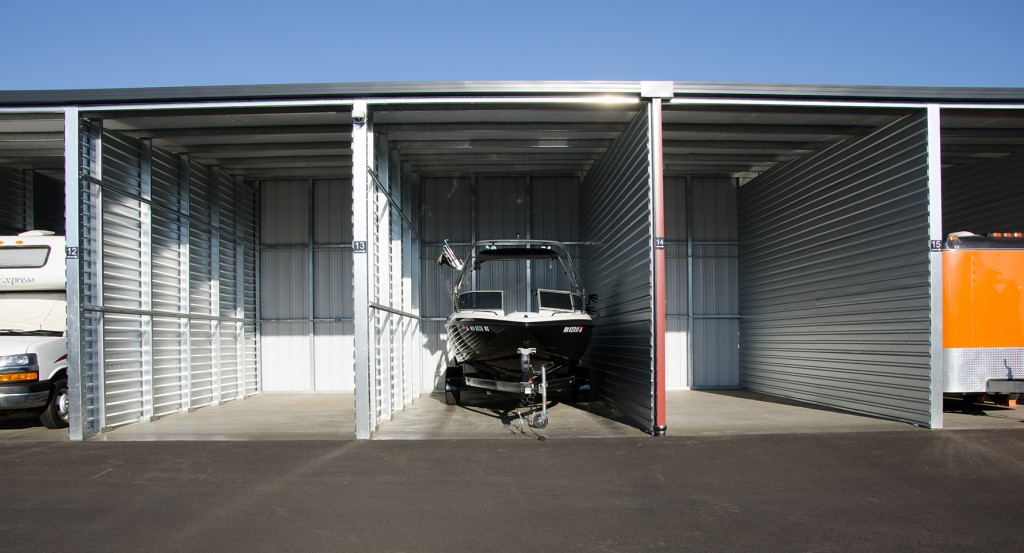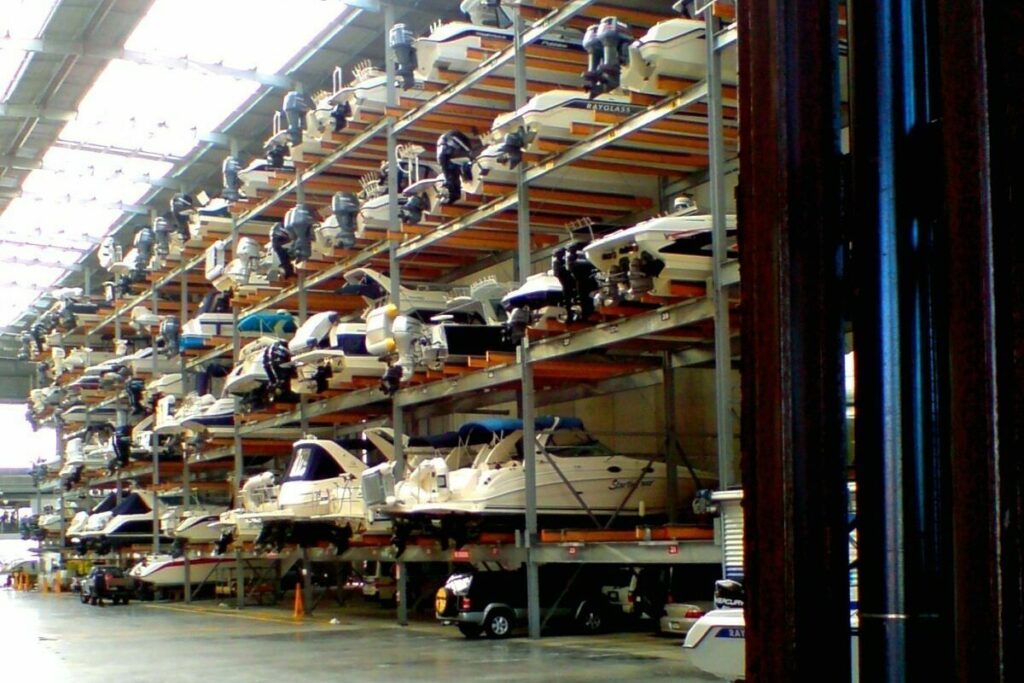Boat Storage: Where Should You Store Your Boat?
If you own a boat, chances are boat storage is an issue for you. As a kid growing up near the Mississippi River, we had several boats. But our first and most memorable was our 15-foot Cacci Craft tri-hull runabout. It was the perfect vehicle for water skiing and tubing. But where to store it during the summer and winter months was always something of a challenge. Over the life of that boat we stored it every way you can. In the process, I learned the pros and cons of each.
Read on to explore a comprehensive comparison of boat storage options, each with its unique advantages and considerations, to help you make an informed choice for your vessel.
1. Garage/Premises Boat Storage
- Advantages:
- No monthly fee.
- Immediate access to the boat.
- Disadvantages:
- Inconvenience of transport and launching.
- Potential damage during storage.
- Weather effects if stored outside.
Storing a boat on your own property works for many people. There are a few advantages to doing it this way.
Since you’re storing your boat on your own land, you won’t be paying a monthly fee to have it stored elsewhere. This can add up to be hundreds or even thousands of dollars per year.
Another advantage to this method is that you have immediate access to the boat. You aren’t subject to hour or day restrictions that may come with storing the boat at a storage facility.
The biggest disadvantage of storing the boat yourself is the inconvenience of the transport. Each time you want to use your boat, you’ll have to hitch it up and haul it to a boat landing. You may have to wait in line to get your boat in the water, especially on those perfect summer weekends. Another problem can arise if your storage space is limited. Our garage had two doors, each of which had a narrow opening not much wider than the boat. So, it may take you several tries to back the boat up perfectly into the space. I’ve personally witnessed several instances of trim gashes and dents during the process of inserting our boat into the garage. Obviously, this won’t be a problem if you store it outside. However, this comes with its own issues. Weather of all kinds takes its toll on your boat. Sun can break down the fibers in your boat cover and the rubber of your trailer tires. Rain and humidity can create mold and mildew that is hard to get rid of completely. Remember not to leave any food on board while it’s stored, to avoid rodent damage. If you do decide to store it outside, consider purchasing a pop-up shelter like those sold by eCanopy. These are inexpensive and provide protection from the elements.
2. Self-Storage Facility
- Advantages:
- Higher level of security.
- Options for enclosed, covered, or uncovered parking.
- Long access hours.
- Disadvantages:
- Monthly costs.
- Need to trailer the boat to and from a boat landing.
Another option is to store your boat at a self-storage facility near you that accepts boats. A great advantage of storing it here is the higher level of security you’ll receive. At West Coast Self-Storage facilities, we offer a number of security measures including perimeter fencing, gated entry with digital pin code access, and 24-hour digital video surveillance. Some facilities offer both enclosed, garage-type units as well as covered and uncovered boat parking. Some even offer electricity and water. You’ll still be in the situation of needing to trailer your boat to and from a boat landing. And you will have to take into consideration the access hours the facility offers. West Coast facilities offer long access hours from 6 am to 10 pm, every day of the year, so this shouldn’t be much of an issue. While there are monthly costs to storing your boat at a self-storage facility, this is the cheapest of all the managed storage options.
3. Dry Dock Boat Storage
- Advantages:
- Convenience of not having to trailer the boat.
- Protection from elements.
- Disadvantages:
- Higher cost.
- Limited hours for boat retrieval.
Dry dock storage is typically found near a marina and most look like large warehouses. Storing your boat in a dry dock warehouse is a convenient alternative to storing it yourself. And as part of the service, when you want to use your boat, you will typically call ahead to the dry dock operation and request that they get your boat out of storage. Some operations will even fuel it up if you ask them to. When you arrive, your boat is already in the water and ready to sail.
In addition to the convenience factor, storing your boat in dry dock keeps it out of the elements and saves you the trouble of having to store and trailer your boat each time you want to use it.
The downside to this method of storage is the cost. Some operations charge a monthly fee based on the length of your boat, with fees ranging from as little as $9 per foot to as much as $120 per foot depending on what part of the country you live in and the amenities that the dry dock service offers. There are also facilities where you can purchase a dry dock storage space, with some going for as much as $70k. BoatUS mentions that beyond the monthly rent, there may be additional charges depending on the height and/or width of your boat, as well as for additional services such as washing out the tanks or flushing the engine.
Also, dry dock storage hours can vary from facility to facility, but most do not offer night retrieval. So if you are the kind of boater that likes to take midnight cruises, this will not be a good fit for you.
4. Marina Storage
- Advantages:
- Access to the boat may be available 24/7.
- Ideal for boats used at a single location.
- Social and convenience factors if the boat is large enough.
- Disadvantages:
- Most expensive option.
- Potential damage from extended water exposure.
If you plan on using your boat at only one location or body of water, a marina slip is probably the best option for you. Depending on the marina, access to your boat can be 24-7, 365 days a year. In addition, having your boat stored at a marina allows you to stay in port while enjoying your boat. If your boat is big enough, it makes a convenience place to meet with friends or other boat owners for social activities.
However, renting a boat slip is also the most expensive storage option. ImproveSailing.com estimates the cost for renting a slip can go anywhere from $12/ft per year to $240/ft per year, with an average of roughly $50/ft per year. However, a visit to DockSlips.com showed that some slips go for as high as $2,800 per month. Rental rates are always size-based, either by foot or a range of feet and typically include electricity and water.
In addition, boats kept in either saltwater or freshwater for months are exposed to mussels, crustaceans, and algae, which can accumulate on the boat hull. This can require the hull to be acid washed at the end of the season, thereby adding additional cost to your rental. While unusual, delamination and hull blisters can happen on vessels that stay in the water for long periods of time.
Conclusion
As you can see, there are many options to choose from when deciding how to store your boat. It all comes down to cost, convenience, and safety. After deciding which option you’ll go with, be sure to do your homework. If you decide on using an offsite storage solution, read reviews of storage facilities, dry dock facilities and marinas. Be sure you know the specifics of their policies regarding what they do and what they cover. In almost every instance, your rental agreement will require you to carry insurance. Some facilities will offer this while others will not. Happy boating!

About the Author: Derek Hines
Digital Marketing Specialist
Derek is originally from the great state of Wisconsin (go Badgers), but is slowly becoming a Pacific Northwesterner. As part of the Digital Marketing team, he writes extensively on storage, moving and life for West Coast Self-Storage, based in Everett, Washington.





